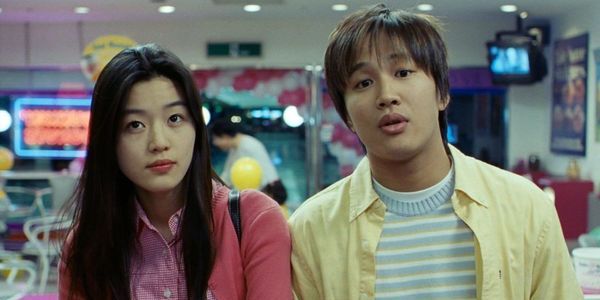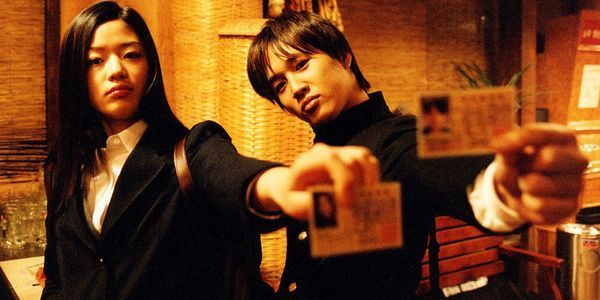MY SASSY GIRL: A Perfect Union Of Romance And Comedy

Wilson is a cinema enthusiast based out of Toronto, Canada.…
Like everyone else who grew up during South Korea’s ascent to the international film scene in the early 2000s, Kwak Jae-yong’s Sassy Girl was one of my first exposures to Korean cinema. While Park Chan-wook‘s Oldboy (which came out 2 years later in 2003) might have been the dominating force amongst critics, and Bong Joon-ho‘s Parasite served as the more recent anchor for Western audiences, anyone who followed Asian cinema in the early aughts probably got their initial fix of Korean cinema from this oddball romantic comedy. And despite being an archetypical example of a culturally specific romance story, My Sassy Girl was fitted with a universal appeal that somehow transcended the usual barriers faced by these kinds of films. Nearly two decades later, it still holds up as an endearing love story that features a perfect union of romance and comedy.
When we’re first introduced to ‘the girl’ (Jun Ji-hyun), she’s at an apparent low point in her life and at the brink of falling in front of a moving subway cart. At the very last minute, she’s pulled away by Kyun-woo (Cha Tae-hyun), a nearby onlooker who happened to witness the unraveling gesture of danger. This rather morbid first interaction serves as the basis of what becomes a pointed romantic relationship. As Kyun-woo tries to eagerly court this mysterious girl he’s just met, he struggles at keeping up with her strong-armed personality.
Making something old feel new
Thinking back to the early 2000s, it made sense that a film like Oldboy got the international attention it did. But for a romantic comedy to generate such recognition and attention amongst international audiences (particularly in Asia) is certainly unusual. And what makes My Sassy Girl such an accomplishment is that the story itself isn’t even all that original; a stubborn and oddly behaved female lead clashing with a much more passive male lead, who ends up falling in love with each other? That’s a story that has been told by literally every country that has ever produced a film. But the underlying ‘sassiness’ of not just the characters, but the sum of all parts, is what makes it a unique experience unlike anything else.

It’s hard to put into words, but there’s almost a sense of aggression to parts of the film that just pairs so well with its softer and more tender moments. This constant tension creates a sense of excitement that drives the film with a level of kinetic energy that is unexpected for a romantic comedy. The honey and vinegar concoction is just so tastefully pleasant to watch, with Jun and Cha creating tight chemistry right from their very first scene together. The film really creates ingenuity with material that, on paper at least, shouldn’t really feel all that original. As further proof, it even makes one of the most overused themes in romantic popular culture (Pachelbel’s Canon – albeit a variation of it by George Winston) feel refreshing and new. And for the record, my heart still melts every time I watch that scene.
Lightning doesn’t strike twice
Reflecting on My Sassy Girl so many years later, it’s hard not to think about everything that has come after it in terms of romantic comedies. Like any other genre in film, romantic comedies existed long before it and will continue to live on in its many iterations throughout cinema. But sticking to the general conception of what a specific genre should be and still sparking an innovative product is hard to come by, and My Sassy Girl being a prime example of that. It’s a true specimen of its time, and is unlikely to be replicated, no matter how hard one tries. Whether it’s the spiritual prequel Windstruck, the horrid Hollywood remake in 2008, or the well-intentioned official sequel My New Sassy Girl, no film has replicated the magic and allure of the original.

Why that is isn’t completely clear, as the above-aforementioned films, in addition to a slew of other films with a mismatched coupling of romantic leads (both before and after My Sassy Girl) are essentially sewn from the same playbook. But knowing that lightning rarely strikes twice, the sum of all its individual parts just worked in a way that elevated how magical romantic comedies could be, even if just temporarily. Whether it was the breakthrough performances of both Jun (in particular) and Cha, or the inventiveness of an offbeat romantic pairing, everything just came together with perfection. And of course, the magnetism of nostalgia from looking back on a film that first sparked joy more than two decades ago certainly adds to its charm.
Final thoughts
Even though South Korea has churned out many (and I mean many) more romantic comedies over the past 20 years, no film has been able to replicate the magic of My Sassy Girl. The film isn’t without its faults but somehow stands as a relatively bulletproof example of cinema that is hard to criticize. The mesmerizing allure of the film’s overarching love story and quirky sensibilities make it a timeless entry in the romantic comedy genre. It’s not a perfect specimen in filmmaking, but like the messy relationship depicted in the film itself, My Sassy Girl is an imperfect exercise in romantic storytelling that can’t help but win you over.
Have you seen My Sassy Girl? What are your thoughts? Let us know in the comments below!
Watch My Sassy Girl
Does content like this matter to you?
Become a Member and support film journalism. Unlock access to all of Film Inquiry`s great articles. Join a community of like-minded readers who are passionate about cinema - get access to our private members Network, give back to independent filmmakers, and more.
Wilson is a cinema enthusiast based out of Toronto, Canada. He escapes from his day job by writing random thoughts about cinema on the internet. Although he has a longstanding penchant for Hong Kong cinema, he considers himself to be an advocate for Asian cinema in general. He has been attending the Toronto International Film Festival every year since 2005, and more of his work can be found on his website: www.wilson-kwong.com.













